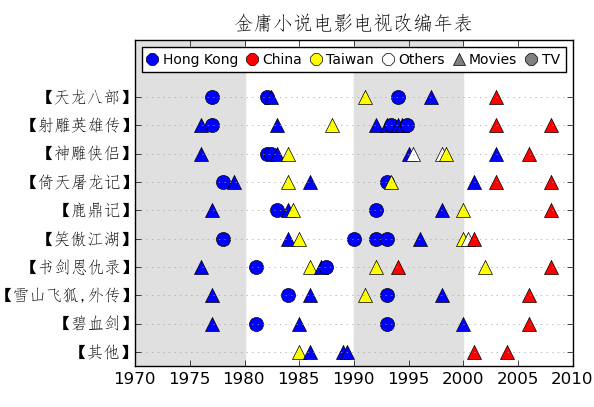The Hong Kong film industry, once a vibrant and dominant player in the Chinese and Asia cinema, is in a steep decline. It happens that I come across a web entry on Jin Yong (金庸), the most popular and prolific martial art novels writer in Asia. In the entry is a chronological list of all the screen adaptations. Since Jin Yong's novels has been made into TV and movies in regularity, it serves as a proxy to the activity of the entertainment industry.
I have plotted the adaption of each popular novel on a graph, with different colors to differentiate the country of production. The dense chart shows that each novel has been adapted multiple times, sometimes within only a short span of time. Looking decade by decade, you'll see how the pattern has shifted. Jin Yong stories first appear on Hong Kong TV in the 70s. It was the time when most families started to own a TV. 80s is the period when a lot of early and now classic adaptions are made. Taiwan has also started to made Jin Yong stories in this period. 90s continues the frenzy activities. It is also the beginning of decline of the Hong Kong movie industry. The last Jin Yong movie was made in 1994. In 2000s, the 3 decades of restless Hong Kong entertainment production seems to come an end. The last TV made by actors is in 2001 (an animation came in 2003). Instead it is the era of China, where nearly all new productions are now made.

The filmography is not just a list black and white raw text. It comes to life once we carefully render it into a color graph. And the graph tells a story of the rise and fall of the different players in the industry.
2010.08.20 - comments
